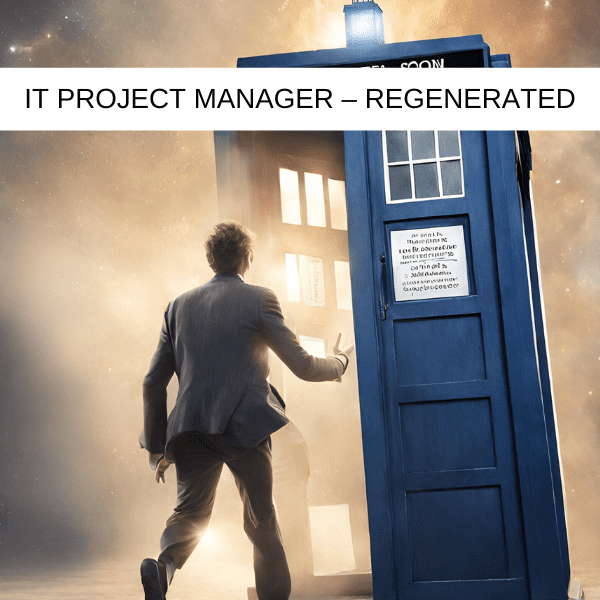I have lost count of how often I’ve either written about, or read about, “The IT Project Manager of the future”!! Or the evolution of the profession!! Or the key skills that project managers will need next year or in five or ten years.
It’s an evergreen topic!
IT Project Managers are forever progressing and regenerating to meet the needs of the profession, their organisation, or their industry sector.
We are again, right now.
This time … it feels different.
REGENERATION
Do you watch Doctor Who? I find the concept of the central character’s ability to regenerate fascinating. The same “person” but with changing and evolving attitudes, moods, methods, quirks, and ways. It has always chimed with me and the way that we adapt.
This last time, the Doctor’s regeneration felt even more relatable and of-the-moment, as David Tennant’s second incarnation “bi-generated” into Ncuti Gatwa and David’s Doctor remained to live a ‘human’ life with the Noble family.
I think that the Project Manager’s next regeneration is going to lean into our more human side too!
Gartner research shows a further shift to agile development and product management models, 44% of work is now delivered through agile methods. How long before agile use tips the “method pivot” over the 50% mark? A year, two years? Furthermore, 82% of senior leaders say AI will have at least some impact on how projects are run at their organisation over the next five years. Times, they are a-changing!
WHAT WILL OUR ROLE BE?
Gartner reports that traditional project management activities (like requirement validation, maintaining scope and benefit measurement) “have become the domain of autonomous delivery teams (i.e., multidisciplinary teams accountable for business outcomes) such as scrum and fusion teams”.
What’s more, generative AI especially (but other tech advances too) now mean many project manager tasks can be successfully automated: project planning; resource utilisation tracking; business case creation; Risk management; Time and cost management; and assistance with writing (GenAI is being widely used to improve things like documents and emails, improving communication). AI can also be used to generate code, summarise meeting notes and compile and curate lessons learned from past projects!
I hadn’t realised, until I read a fabulous Harvard Business Review article, that The Scrum Guide and SAFe Reference Guide, two popular agile reference manuals, appear to not mention the project manager role at all! Eeeeeeeeeeek!!
WE’RE NOT TOAST THOUGH, RIGHT?
Rather than fire up our CVs or ramp up that side hustle, Project Managers can expect to discover a new kind of busy! A recent global Gartner survey predicts that project managers will be one of the fastest-growing project management office (PMO) roles across the next two or three years.
As previously alluded to, I think Project Managers will lean more into our “human” soft skills. Writing for HBR, Gartner’s Rachel Longhurst and Woojin Choi say, “While AI offers promising benefits for project management, machines will never be able to replicate the uniquely human aspects of the job, such as relationship building and stakeholder management.” I’m nervous about committing to ‘never’ but broadly, I reckon that they are right.
By 2026, Gartner predicts that two-thirds of project managers’ skills and roles will be redesigned to align with new requirements driven by evolving operational environments. HBR surveyed 373 project management leaders and identified 10 “next-generation” skills that “have a disproportionate impact on performance”. They report that Project managers with these skills are “1.4 times more effective at achieving key business and functional outcomes”.
These next-generation skills include: Organisational awareness; Data acumen; Cross-functional collaboration; Decision making; Willingness to explore and adopt new technology; Financial acumen; Process and framework expertise (i.e., business process improvement, agile, organizational change management, risk); Customer centricity; Growth mindset; The ability to coach and motivate their teams.
Did you notice how the skills PMs will need can be classed as “human” skills? Also, the research suggests that these skills are “far more impactful” than formal project management certifications.
“Organizational awareness, cross-functional collaboration, and customer centricity are especially important in the context of agile and product-centric delivery, where the nature of work involves bridging organizational silos and delivering enterprise-wide value,” say Gartner, “Project managers are at the intersection of a growing number of customers and stakeholders. As such, they must operate with a wider purview and more strategically to maximize business value.”
And it just so happens most of us already do!
THE TOP 11 HUMAN SKILLS PMs WILL NEED (AND ALREADY HAVE)
Given this incoming “new era” for Project Managers, I asked a handful of fellow professionals what skills they thought we already have that make us future ready. The responses were reassuring:
1 – Communication: Clear and effective communication will be essential. Project managers articulate ideas, convey information, and the best project leaders actively listen to team members and stakeholders.
2 – Emotional Intelligence: Everyone mentioned this! Understanding and managing our emotions and being empathetic to the feelings and needs of others is crucial. AI will not replace project talent in this area during my career (Famous last words!!) Emotional intelligence is vital for building strong relationships, in an arena with more “machine input” this will be more important.
3 – Leadership: Project managers will have to inspire and motivate teams more than ever. Leadership already involves guiding the team toward common goals, making decisions, and being accountable for outcomes, good and bad!
4 – Teamwork/Collaboration: Project managers already work with diverse teams, but autonomous tech solutions will mean we will have to build stronger working relationships, encourage collaboration, and resolve conflicts – all of which is already part of our skillset.
5 – Adaptability: Projects are dynamic and are a breeding ground for unexpected challenges, AI can deliver an extra layer of “what can go wrong”. Being flexible and adaptable already helps project managers navigate uncertainties and make necessary adjustments to the project plan, this is a power skill to nurture and develop.
6 – Problem-solving: The ability to analyse problems, identify solutions, and make decisions is a valuable skill we already possess. Project managers now expect to encounter various issues during the project lifecycle, we’re ready to scale this!
7 – Time Management: Projects are increasingly time sensitive. Show me someone better than a Project Manager at prioritising tasks, setting deadlines, and ensuring a project progresses on schedule – I’ll wait!!
8 – Negotiation: Project managers often negotiate with team members, stakeholders and vendors. The vibe from industry colleagues is that all project processes will accelerate and so must the negotiation process! Our strong negotiation skills will help reach timely agreements and efficiently resolve conflicts.
9 – Risk Management: More and more risk assessment will be overseen by AI over time, but we think it will be a long time before a human element becomes obsolete. Soft skills in risk assessment, anticipation, and contingency planning are essential, and will be for the foreseeable future.
10 – Stakeholder Management: Building and maintaining positive relationships with stakeholders is among the most key parts of what we do. understanding needs, keeping stakeholders informed, and managing expectations is just going to become more important.
11 – Decision-making: A friend is currently working on software that will revolutionise some project decision making, and I bet he isn’t the only one. He admits though, that we are some way off dispensing with the services of project management talent when it comes to the more nuanced decisions that Project Managers need to make. Good judgment, the ability to quickly weigh up pros and cons, and the ability (and experience) to select the key data to make informed decisions are critical for the big decisions and IT project success now. They always will be.
Comfortingly, we could have gone on and on listing the human skills that project talent already have that will set us up for the future, perhaps you have some of your own – I’d love to hear from you.
GARTNER’S FUTURE-FOCUSED PROJECT MANAGER ROLES
Lastly, Gartner has named three critical roles that project managers will play to meet their organisations’ future needs, and these are worth a quick mention: teacher, fixer, and orchestrator.
The Teacher: For organizations early in their digital journey.
The Fixer: For organizations seeking to boost their delivery efficiency.
The Orchestrator: For organizations that need improved cross-functional coordination.
Follow this link to read more about these roles. When you do, you’ll see how these roles that Gartner have identified dovetail perfectly with the human skills that project managers already have. Rachel Longhurst and Woojin Choi’s HBR piece amplifies this, “What’s notable about the next-generation skills,” they write, “is not that they’re new in and of themselves; rather, it’s that they collectively highlight the uniquely human aspects of project management that go beyond performing discrete, repetitive project management tasks.”
THE “OLD AND NEW CHALLENGE”
It does throw a “new” challenge toward those tasked with resourcing IT Projects.
Organisations are struggling with talent gaps now, shifts toward agile and increased need for the human skills (as AI takes over many more “mechanical” processes and functions) could seismically change this dynamic, fuelling capability gaps, in waterfall leaning enterprises, for instance.
So, paradoxically, this is a new challenge – but it’s also as old as the hills! A talent shortage is a talent shortage, whatever caused it and Stoneseed has always been like the fourth emergency service in these instances.
Now would be a good time for a competency and skills audit, followed by any training and upskilling, and adding Stoneseed’s Project Management as a Service to your bookmarks and 01623 723910 to your phonebook.
There are challenging and interesting times ahead for the regenerated project manager, ultimately though, that’s what gets most PMs out of bed in the morning! Alons-y! (if you know, you know!)
Find out more about Project Management as a Service from Stoneseed
Sources
https://hbr.org/2023/11/what-the-next-generation-of-project-management-will-look-like



